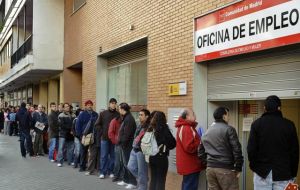MercoPress. South Atlantic News Agency
Slightly encouraging signs from the EU in employment and manufacturing
 However under 25 unemployment in Spain remains dramatic: 56%
However under 25 unemployment in Spain remains dramatic: 56% The number of unemployed in the Euro-zone has fallen, slightly, for the first time since April 2011. The fall in June came amid brightening economic prospects, suggesting an end to the bloc’s stubborn recession.
However the number of jobless in June remained at 19.27 million people, some 24,000 fewer than in the previous month of May, according to the latest figures released by the EU statistics office, Eurostat, on Wednesday.
The first month-on-month drop since April 2011, however, didn't reflect in the unemployment rate, which remained unchanged at 12.1% after Eurostat had revised the figure for May.
In the wider 28-member European Union, unemployment also fell slightly in June, dropping to 10.9% from 11% in May, Eurostat said.
The slight easing of the jobs crisis in Europe comes as economic activity and business confidence are recovering, raising hopes of an end to the recession, notably in debt-laden Euro zone countries.
In Spain, for example, the number of people out of work fell to 5.96 million in June from 6 million in May, Eurostat data showed. The lowest joblessness in Europe was reported from Austria and Germany with June rates of 4.6% and 5.4% respectively.
However, Eurostat data also showed that unemployment among young people under the age of 25 remained dreadfully high and was even growing.
In this age group, 3.53 million people were jobless in the Euro zone, bringing the rate to 23.9% from 23.8% in May. The most harrowing youth jobless numbers were again reported from Greece and Spain, where 58% and 56% of the young people were out of work. In the wider European Union the under 25 unemployed totalled 5.512 million.
Last week it was revealed that private sector industry in the Euro-zone returned to growth in July. The Markit Euro zone Purchasing Managers' Index, which measures business output, was 50.4 in July. A figure above 50 indicates expansion. July's figure was up from 48.7 in June, and marks an 18-month high. The Euro-zone has been in recession since the end of 2011.
Also on Wednesday, Eurostat reported that consumer price inflation in the Euro-zone was unchanged at 1.6% in the year to July, in line with expectations. But in a sign that all is not yet well in the Euro zone, new data from Europe's largest economy - Germany - showed that retail sales fell by 1.5% in June from the month before, their biggest drop this year,
Sales fell by 2.8% from a year earlier, due largely to declining sales of food, drinks and tobacco.
On Wednesday Spain also revealed that the country remains in recession but only just.
The country’s National Statistics Institute said the Spanish economy contracted in the second quarter by a quarterly rate of 0.1% as a result of weak domestic consumer demand. That offset a solid export performance.
That was Spain’s eighth straight quarter fall. The contraction was better than the 0.5% fall recorded in the first three months of 2013.
Spain has been in recession for most of the past four years following the collapse of its real estate sector in 2008. Despite 27.2 % unemployment and a bloated deficit, the government claims its reforms and austerity measures are paying off. It predicts the economy could start growing again in the third quarter. On a year-on-year basis, Spain’s economy was 1.7% smaller




Top Comments
Disclaimer & comment rulesCommenting for this story is now closed.
If you have a Facebook account, become a fan and comment on our Facebook Page!